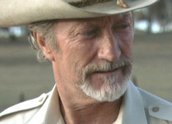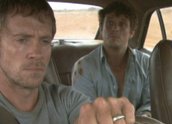


Cactus (2007)
Synopsis
In inner-city Sydney at night, John Kelly (Travis McMahon) captures and drugs a young man, Eli (David Lyons), places him in the boot of his beat-up 1972 Ford Fairmont XA and drives him out of the city. The next day in the bush he accidentally swerves into the path of a police vehicle and is stopped by the driver, local policeman Rosco (Bryan Brown). Not realising John has a man in the boot, the cop lets him off with a warning.
In remote country John digs up a 'road closed due to flooding’ sign from the side of the road and places it on the tarmac. Later he lets Eli out of the boot and lets him sit in the back seat of the car – tied and initially gagged, though when Eli keeps noisily protesting he removes the gag. Eli tries to discover the reason for his kidnapping and simultaneously tries to get under John’s skin with a series of needling questions and accusations about his captor’s behaviour and possible background. John says he doesn’t know the reason for his capture and refuses to reveal the identity of the person who has ordered the kidnapping – and to whom he intends to make delivery.
John’s status as a husband and father is made obvious by a fluffy toy and, later on, medical documents that Eli finds in the car. This makes him increasingly vulnerable to Eli’s taunting. Eli speculates that he has been kidnapped by someone who lost money after taking his advice in his horse betting scam, the details of which he explains, though John refuses to confirm his suspicion. When a road train comes across John’s road sign, the driver (Shane Jacobson) briefly stops and phones Rosco to confirm there’s been no flooding before driving on. Eli meanwhile has made John so annoyed that he locks him in the car and forces him to listen to a Wiggles song very loud, played on repeat, as a form of torture, while he climbs a nearby hill and phones his wife and pretends he’s at a convention.
John returns to find the road train driver has discovered Eli. He shoots and wounds the driver and forces Eli to help lift the man into his truck where he will have a better chance of survival. Eli, becoming increasingly desperate, tries to bargain for his release. As the story reaches its climax, the two men reveal they have formed an understanding that neither of them could have predicted.
Curator’s notes
Cactus is a lean, exciting and well-written genre film that echoes a number of filmmaking traditions. Most obviously it’s one of a long line of road movies that reflect the central place of the car in Australian society, including Mad Max (1979) and Mad Max 2 (1981), True Love and Chaos (1997) and The Magician (2005), also about a kidnapper and his victim(s).
But it also has strong echoes of a US sub-genre of 'desert noir’ that uses the isolation of desert locations to help intensify an atmosphere of doom and despair. The sub-genre began with movies like Detour (1945) and The Hitch-Hiker (1953) and continued in the 1980s and beyond with the likes of Delusion (1991), U-Turn (1997) and The Hitcher (1986) and its 2007 remake, which both added strong shades of horror. The desert and the outback in Australian cinema has long been a place of danger and the unknown, with Wolf Creek (2005) a vivid recent example. But Cactus, while full of thrills and suspense, never develops into a horror film, gradually revealing a more humanistic agenda as it employs genre conventions to explore notions of masculinity, class and power.
An early Stephen Frears film, The Hit (1984), had a similar scenario: a man is kidnapped and driven across country to meet an elusive Mr Big but sets about turning the tables on his captors using verbal power games, though there are also significant differences. In Cactus, John is nominally the villain, initially seen as a ruthless character who cold-bloodedly kidnaps an apparently innocent man. Yet as the film develops we see John’s tough outer shell slowly flaking away to reveal the family man underneath – the loving father of a child and a husband who is desperate for money his wife needs for health treatment. The title appears to be a metaphorical reference to John’s character – hard and prickly on the outside but soft on the inside. The film, incidentally, never features a cactus. Victim Eli meanwhile becomes less sympathetic the more we learn about him, emerging as an apparently selfish scam artist who blames his victims for their loss of money.
Class is a key factor in the relationship between the two men. The kidnapper’s pathetically beaten-up and unreliable Ford signals his position at the bottom of the social pack, as does his willingness to do this criminal job for what Eli considers an insultingly low fee. He also reveals he has a poorly-paid day job, whereas Eli enjoys a comfortably middle-class lifestyle, yet appears to do no work to earn it other than his confidence tricks involving racing bets. Eli’s efforts at self-preservation, while perfectly understandable, tend to make him look self-centred. Not once does he mention any loved ones who might be devastated by his disappearance.
First-time writer-director Jasmine Yuen-Carrucan artfully draws the viewer into identifying with John while avoiding the sentimentality that could very easily have toppled the film. Deadpan, often black, humour is a crucial part of her method, from the cop’s playfully long-winded speech to the method of torture used against Eli – the repetition of a song by popular children’s act the Wiggles. In the two lead roles she casts two relatively unknown but impressive actors while placing the iconic Bryan Brown (also credited as executive producer) and Shane Jacobson (known for the lead role of Kenny, 2006) in memorable supporting roles.
Yuen-Carrucan, who has a film background as camera assistant, displays unusually well-developed visual and script skills for a first-time writer-director. Visually the film employs effective contrasts between its agoraphobic exteriors and claustrophobic interiors, while the script shows an admirable economy – from the dialogue, which never gives too much away, to the refusal to show the audience the elusive Mr Big who has hired John. Also impressive is the confidence with which Yuen-Carrucan starts the film, pitching viewers straight into the action without needlessly setting up the characters. Everything we need to know about them will emerge on the road. She understands that nothing kills viewer engagement quicker than over-explanation.
- Overview
- Curator’s notes
- Video 3 clips
- Principal credits
- Find a copy
- Make a comment
- Map
- Add your review



